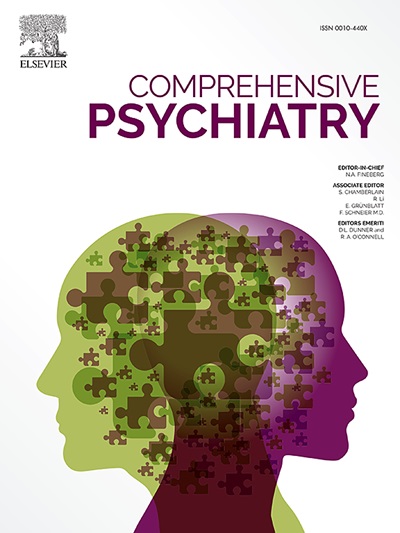失眠症的住院与门诊认知行为疗法:一项平行随机对照试验
IF 4.2
2区 医学
Q1 PSYCHIATRY
引用次数: 0
摘要
目的:虽然门诊认知行为治疗失眠(CBT-I)是最有效的治疗方法,但约50%的患者无法达到临床缓解。迫切需要制定更有效的CBT-I交付方法。本研究评估了住院1周的CBT-I和标准门诊8周的CBT-I的比较疗效。方法对200例成人慢性失眠症患者进行随机对照试验。这些参与者被随机分配到住院组(n = 100)或门诊组(n = 100)。住院组接受了为期一周的强化住院CBT-I,随后是每周的随访计划。门诊组参加了一个标准的门诊CBT-I项目,以个人为基础,为期八周。主要结果是干预开始后9周的失眠严重程度指数评分。意向-治疗分析采用线性混合效应模型。结果在9周的评估中,住院患者CBT-I组失眠严重程度指数得分的平均变化为- 13.31(95%置信区间[CI], - 14.47至- 12.16;Cohen’s d =−3.18;P & lt;措施)。门诊组平均变化为- 11.14 (95% CI, - 12.30 ~ - 9.98;Cohen’s d =−2.66;P & lt;措施)。组间平均差异为- 2.03 (95% CI, - 3.21 ~ - 0.85;Cohen’s d = - 0.48;P & lt;.001),表明住院组与门诊组相比有统计学上的显著改善。结论与门诊患者相比,住院患者CBT-I在减轻失眠严重程度方面表现出更强的疗效。本文章由计算机程序翻译,如有差异,请以英文原文为准。
Inpatient vs outpatient cognitive behavioral therapy for insomnia: A two-arm parallel randomized controlled trial
Objective
While outpatient cognitive behavioral therapy for insomnia (CBT-I) represents the most efficacious delivery method, approximately 50 % of patients are unable to achieve clinical remission. There is a pressing need to develop more effective approaches to CBT-I delivery. This study assessed the comparative efficacy of one-week inpatient CBT-I and eight-week standard outpatient CBT-I.
Methods
A randomized controlled trial was conducted with 200 adults with chronic insomnia disorder. These participants were randomly allocated to either the inpatient group (n = 100) or the outpatient group (n = 100). The inpatient group underwent a one-week intensive inpatient CBT-I followed by weekly follow-ups program. The outpatient group participated in a standard outpatient CBT-I program conducted on an individual basis over an eight-week period. The primary outcome was the insomnia severity index score at 9 weeks after the start of intervention. Linear mixed effects model was employed for the intention-to-treat analysis.
Results
At the 9-week assessment, the inpatient CBT-I group demonstrated a mean change in insomnia severity index score of −13.31 (95 % confidence interval [CI], −14.47 to −12.16; Cohen's d = −3.18; P < .001). The outpatient group showed a mean change of −11.14 (95 % CI, −12.30 to −9.98; Cohen's d = −2.66; P < .001). The mean difference between groups was −2.03 (95 % CI, −3.21 to −0.85; Cohen's d = −0.48; P < .001), indicating a statistically significant improvement in the inpatient group compared to the outpatient group.
Conclusions
This study demonstrated that inpatient CBT-I exhibited superior efficacy compared to outpatient CBT-I in alleviating insomnia severity.
求助全文
通过发布文献求助,成功后即可免费获取论文全文。
去求助
来源期刊

Comprehensive psychiatry
医学-精神病学
CiteScore
12.50
自引率
1.40%
发文量
64
审稿时长
29 days
期刊介绍:
"Comprehensive Psychiatry" is an open access, peer-reviewed journal dedicated to the field of psychiatry and mental health. Its primary mission is to share the latest advancements in knowledge to enhance patient care and deepen the understanding of mental illnesses. The journal is supported by a diverse team of international editors and peer reviewers, ensuring the publication of high-quality research with a strong focus on clinical relevance and the implications for psychopathology.
"Comprehensive Psychiatry" encourages authors to present their research in an accessible manner, facilitating engagement with clinicians, policymakers, and the broader public. By embracing an open access policy, the journal aims to maximize the global impact of its content, making it readily available to a wide audience and fostering scientific collaboration and public awareness beyond the traditional academic community. This approach is designed to promote a more inclusive and informed dialogue on mental health, contributing to the overall progress in the field.
 求助内容:
求助内容: 应助结果提醒方式:
应助结果提醒方式:


